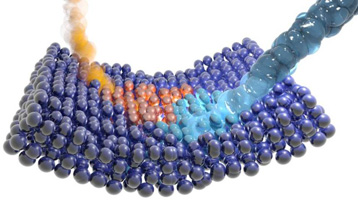Scientists from the Institut Européen des Membranes (CNRS / ENSCM / Université Montpellier 2) and researchers from the Institut de Chimie Radicalaire (CNRS / Aix-Marseille Université) have fabricated a first-of-its-kind dynamic membrane to filter water.
 Schematic representation of a membrane failure (red impact) immediately repaired by water flowing through it (blue). (© Damien Quémener)
Schematic representation of a membrane failure (red impact) immediately repaired by water flowing through it (blue). (© Damien Quémener)
The dynamic membrane is capable of changing its pore size autonomously with respect to water pressure. Moreover, it’s self-healing capability enables self-repairing when it breaks, thus providing enhanced safety to the filtered product and improved operating life. The researchers designed the novel membrane based on cellular membranes.
The dynamic membrane is composed of three polymers that have different solubility and create micelles where there is a continuous interaction between nanoparticles. These micelles tend to be flattened out up to a specific pressure, which results in the reduction of the membrane’s pore size. For example, the membrane’s pore size is roughly 5 nm at low pressures of 0.1 bars and this size enables the filtration of viruses and macromolecules.
The pore size gets increased to 1 nm when the pressure is increased moderately. This pore size filters out surfactants, colorants and salts. On the other hand, the membrane’s morphology is radically changed when the pressure is increased to 5 bars, which in turn increases the size of the pores to 100 nm. This size allows the filtration of suspended particulate matter and bacteria.
This novel property enables the dynamic membrane to be used for all types of filtration needs. Moreover, these 1.3-µm-thick dynamic filters have self-healing capability. The physical equilibrium that clasps the micelles together gets affected when the membrane breaks. Hence, in order to reinstate the equilibrium, the micelles tend to fill the breakage by themselves. By this way, it is possible to repair a tear 85-fold bigger than the membrane’s thickness without discontinuing the filtration operation and without human interference.